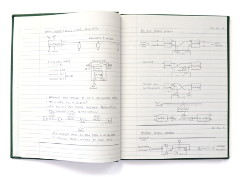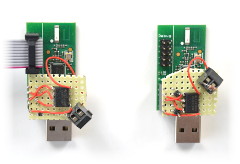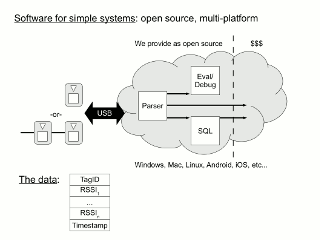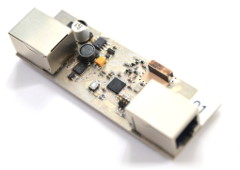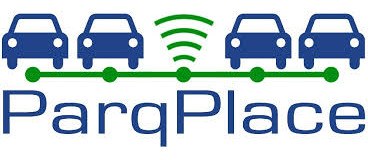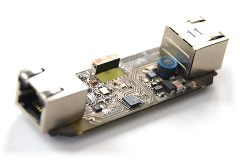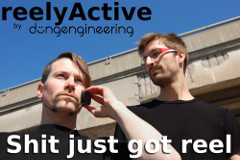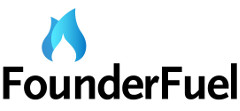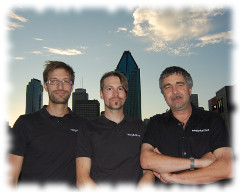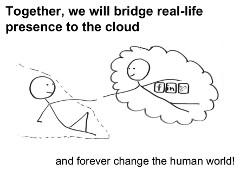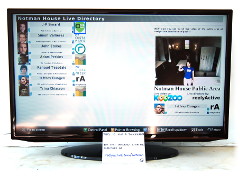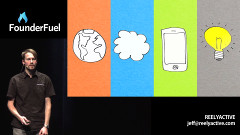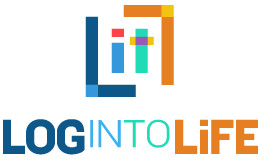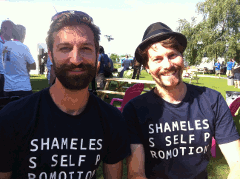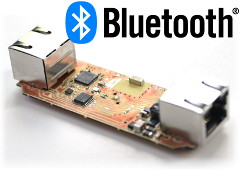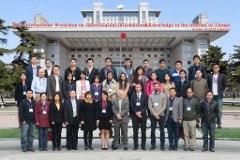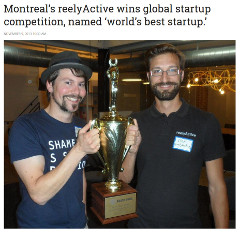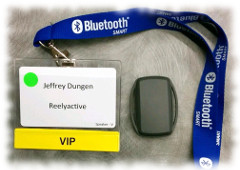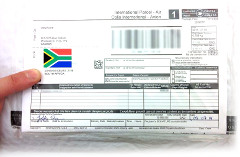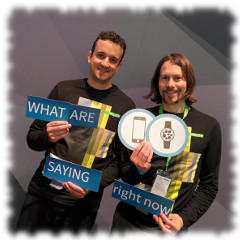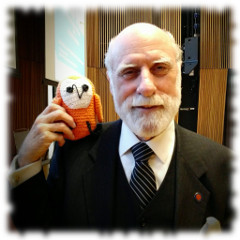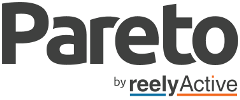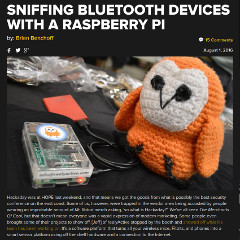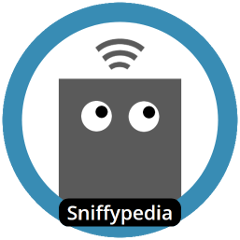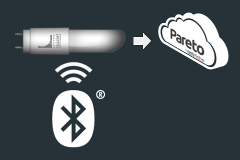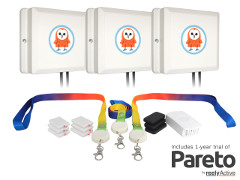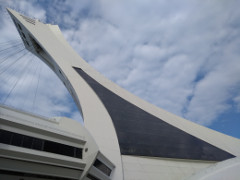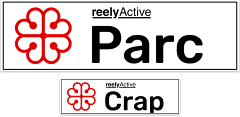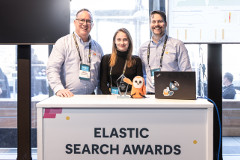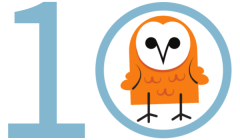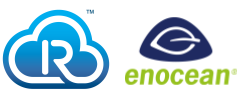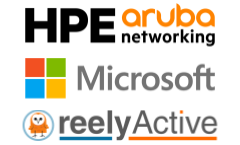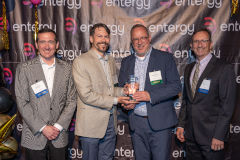
2011-2012: Initial idea to initial client
The origin story of the reel and of reelyActive.
Feb. 2011: First reel sketches
While the first sketch of a "Generic RFID Tag/Receiver" dates to December 2010, the first sketch of what would become the reel architecture was entered in Jeff's notebook on Valentine's Day 2011.
Apr. 2011: Registered reelyactive.com domain
The first recorded use of the term reel dates to March 2011. Not long after, while passing the time waiting for a flight, thinking about the future of Active RFID, the name reelyActive was coined and the domain promptly registered.
May. 2011: Validation of the reel
Using development boards and rudimentary daughterboards assembled from parts on hand, the concept of relaying decoded radio packets via daisy-chained infrastructure was successfully validated for the first time.
Sep. 2011: First pitch to co-founders
Simple, inexpensive, versatile Active RFID. No existing Active RFID technology combines these qualities. That is our edge. That was the title slide of the pitch by Jeff to prospective co-founders Traian, Pier-Olivier and Olivier. Proposed was the open source software foundation still used today.
Dec. 2011: Cause for New Year's celebration
Traian produced and hand-assembled the JTR-02 prototype reelceiver on New Year's Eve. It worked. The critical proof of concept was complete.
Jan. 2012: ParqPlace as initial client
Silicon Valley startup ParqPlace signed on as the initial client with the intent to use the nascent platform as a competitive edge in the race to become the "AirBnB of Parking". Reels would provide a reliable, cost-effective means to identify tagged cars on infill parking lots.
Apr. 2012: Production Reelceiver and Tag
Several prototype iterations would result in the RA-R422-02 reelceiver and RA-T411-02 tag — both of which are still in production today. ParqPlace would receive their first production inventory the following month.
Summer 2012: Shit just got Reel
In a bid to win tickets to the International Startup Festival, content was required for reelyactive.com and the following meme was devised. Up until this time, reelyActive was a project incubated by düngengineering (hence the double-play on words) but that would soon evolve...
2012: FounderFuel Accelerator
Nothing to fear about thinking big.
July 2012: Acceptance in FounderFuel Accelerator
reelyActive was accepted into FounderFuel's third cohort (watch our application video), becoming the first company with a hardware product to participate in a Canadian accelerator. However, reelyActive was not yet a company...
Incorporation
reelyActive would be incorporated as a Québec numbered corporation on July 24th, 2012 with co-founders Pier-Olivier (left), Jeff (centre) and Traian (right) as its administrators.
August 2012: First Formal Pitch
Our first formal pitch to an audience was on day one of the cohort. We were the Proximity Identification Platform and we were going to "bridge real-life presence to the cloud — and forever change the human world!" Years later we'd blog about our reflections on that pitch.
September 2012: Live Directory
We created a live directory for members of the cohort and other occupants of Notman House. Anyone could create their own digital profile and have it appear on screen when they were present with one of our active RFID tags.
November 2012: Demo Day Pitch
With the Internet of Things suddenly becoming the thing, IoT became the focus of not only our Demo Day pitch (which you can watch here), but of our business itself.
2013: Internet of Things Startup Hype
The year with more than a LitL Shameless Self Promotion.
Early 2013: Log in to Life
Driven by the unexpected success of our live directory experiment, and people's eagerness to be digitally discoverable through their physical presence, we developed Log in to Life (explainer video). Nonetheless, the challenge remained that a person needed to carry our active RFID tag to be discoverable.
July 2013: StartupFest
That challenge could be overcome where people expected to wear identification: we tagged all the VIP badges to bring Log in to Life to the International Startup Festival. It was a huge hit among participants and organisers alike (case study), as were our infamous Shameless Self Promotion t-shirts, and we won a competition to become Montréal's Best Startup!
September 2013: BLE Just Got Reel
In anticipation of Apple's iBeacon launch, a Bluetooth Low Energy (BLE) reelceiver was developed and, to coincide with that event, we unveiled our Beyond the Beacon video (which continues to be our most watched to date) and which sparked controversy when it was covered in GigaOM: why were we doing beacons backwards?
October 2013: Scientific Publications
Another point of controversy was our decision to publish rather than patent. Pier-Olivier travelled to Beijing and Sydney to present our first two scientific publications on Hyperlocal Context and our reel architecture respectively.
2014-2015: Putting Things in Context
Piecing together the platform, learning from early adopters.
April 2014: Presentation at Bluetooth World
Thanks to our controversial Beyond the Beacon video, Jeff was invited to present our vision for BLE on the main stage at Bluetooth World in Santa Clara. More importantly, we were able to use the occasion to convince Texas Instruments to provide us with the full (normally restricted) documentation for the BLE chip on our reelceiver, enabling us to pursue that vision with a competitive edge.
August 2014: The barnowl Logo
While the origins of the barnowl software package date to 2013, it was only by way of favour from designer Chris Olimpo, who had then recently produced our Smart Spaces put Things in Context explainer video, that the mascot would come to life. Indeed, barnowl would lead the way towards a series of software mascots.
November 2014: Six Continents Shipped
Thanks to the unique combination of our BLE reelceiver and open source software, described on our context.reelyactive.com website, prescient early adopters were eager to test our technology platform, and within months we had shipped to six continents (alas we're still missing Antarctica).
March 2015: CODE_n IoT at CeBIT
In March 2015, Juan would join the team, travelling with Jeff to CeBIT in Germany to represent reelyActive as the only Canadian startup selected for CODE_n's Into the Internet of Things showcase and competition. Benoît too would join the team later in the year.
December 2015: barnowl meets Vint Cerf in Milan
In October, our barnowl mascot had come to life as a stuffy, and in December we would present our next scientific publication, co-authored by Imran (our summer intern), at the IEEE World Forum on IoT in Milan. Whooooo would have thought barnowl would get to meet Vint Cerf following his keynote (which we much appreciated)!
2016-2017: Perfecting the Platform
Persistence pays off as platform adoption progresses steadily.
April 2016: Pareto and the Starter Kit
Following a development push throughout the Spring of 2016, our Pareto SaaS was launched along with an entry-level starter kit and a well-defined trial program. The new product offering responded to the needs of a growing, broader audience.
August 2016: Pi BLE Sniffer on Hackaday
Taking advantage of the inexpensive Raspberry Pi 3's BLE capabilities, we created a simple, versatile launchpad for experimentation with our open source code (tutorial). Thanks to coverage in Hackaday, a whole new audience was introduced to our vision and began building on our platform.
August 2016: Sniffypedia Launch
With Pareto and the open source tools now identifying countless different BLE devices from countless vendors (Bring-Your-Own-Device), and with integration of RAIN RFID into the platform on the horizon, the sniffypedia.org project was launched as a collaborative "phonebook for the IoT".
November 2017: Bring-Your-Own-Infrastructure
The first smart light to listen for BLE was introduced by Lunera, and as their launch partner, the infrastructure challenge we had faced since the outset suddenly became an infrastructure opportunity: every building is filled with lights! We were now pioneering both BYOI and BYOD!
2018-2019: Towards Mass Adoption
Any physical space anywhere, including literal landmark deployments.
February 2018: Showcase Kit 1.0
One kit to rule them all: the introduction of the Showcase Kit made it possible to quickly and easily evaluate almost any real-time location and sensing application on a modest budget. Clients across diverse industries discovered the potential of real-time location and context through our intuitive Pareto Apps web demos.
September 2018: World's tallest inclined tower
The year would be marked with flagship workplace, retail and healthcare deployments, literally peaking with the Desjardins offices in Montreal's Olympic Stadium tower, our largest permanent deployment to date, and with measurable ROI realised by the client in mere months.
Summer 2019: Pareto Anywhere
An unfilled market need for an open source software platform to aggregate the real-time location and context of all radio-identifiable devices in any physical space was met by our second-generation platform, which would adopt the name Pareto Anywhere for its versatility to operate local, edge and/or cloud.
2020-2022: Parc and the Pandemic
Vision becomes reality in our Park Avenue Research Centre (Parc).
March 2020: Elastic Search Award 🏆
The team's final trip before the pandemic lockdown would be to accept an award for "making physical spaces searchable like the Web" using the Elastic Stack, which we integrated seamlessly with Pareto Anywhere, enabling our users to manipulate and analyse their data like never before.
Summer 2022: 10-year anniversary!
By the time we celebrated our 10-year anniversary, impartial guidance had become our core business, with unconstrained access to our team offered through a subscription model. We offered Behold, Breakthrough and Beyond packages to meet forward-looking organisations at any stage of transformation.
Fall 2022: RAIN RFID & EnOcean Alliance integration
Open source integration with RAIN RFID and EnOcean Alliance devices welcomed over 100 Billion tags and an extensive smart building ecosystem, respectively, to context-aware physical spaces—anywhere.
2023-Present: Interoperability at Scale
Pareto Anywhere finds itself everywhere.
March 2023: Open-source collaboration
In collaboration with HPE Aruba Networking and Microsoft (press release), we launched Pareto Anywhere for Azure, creating the opportunity for 35 million deployed access points to make sense of the data from tens of billions of IoT devices.
May 2024: Entergy Innovation Award 🏆
We travelled to New Orleans to receive a supplier innovation award from Entergy for our collaboration with their team on a wireless sensing solution (case study) for their fleet of nuclear power plants.

